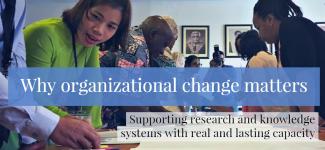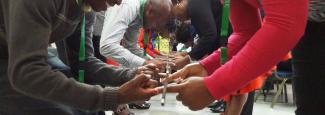Turning the lens on organizational change
Julie Brittain reflects on INASP's achievements and capacity development approaches over the past year and how we have ensured our organization takes the same approach.
We believe passionately in sustainability. It is vital to support organizations in changing their processes, systems and sometimes structures, so that activities continue beyond our partnerships.
Strengthening research and knowledge systems: what approaches have worked best
Our reflections of the five-year Strengthening Research and Knowledge Systems (SRKS) programme highlight the importance of Southern-led organizational change, targeted interventions, online learning, tackling inequities, and adaptive learning for strengthening research and knowledge systems in low- and middle-income countries.
In supporting [overlooked] networks and institutions, we need to go beyond technical skills, to strengthening organizational capacity and effectiveness, enabling them to play stronger roles nationally.
Critical thinking skills connect classroom learning to the world beyond
Empowering young people to achieve their full potential is vital. Our new DFID-funded Transforming Employability for Social Change in East Africa (TESCEA) project is working with higher education in east Africa to foster change at a scale that ensures that ensures students develop the critical-thinking and problem-solving skills that are vital beyond the classroom.
Students need to be engaged in a learning environment that encourages questioning, and that connects classroom learning to the questions that business, communities and government are asking.
Thought pieces
Seven ways to support organizational change for evidence use
How can we support organizational change in the way evidence is used in policy? By listening actively and deeply and by collaborating in a more meaningful way, writes Clara Richards.
Decolonising development: power dynamics in the knowledge sector
Emily Hayter discusses how supporting policy-making organizations to make better use of evidence can help address issues of power and voice in development.
Capacity development is hard to do – but it’s possible to do it well
Real capacity development only happens where work is demand-driven, is Southern-led, and is based on long term engagement and partnership. Jon Harle comments on doing capacity development well.
Highlights
STORIES: Celebrating women in science: Inspirational stories from the Global South
LEARNING, REFLECTIONS & INNOVATION: Robust assessment of publishing quality and practices welcomed by Southern journal editors
LEARNING, REFLECTIONS & INNOVATION: Capacity development in ‘harder to reach’ places
REPORT: Evidence in African Parliaments











